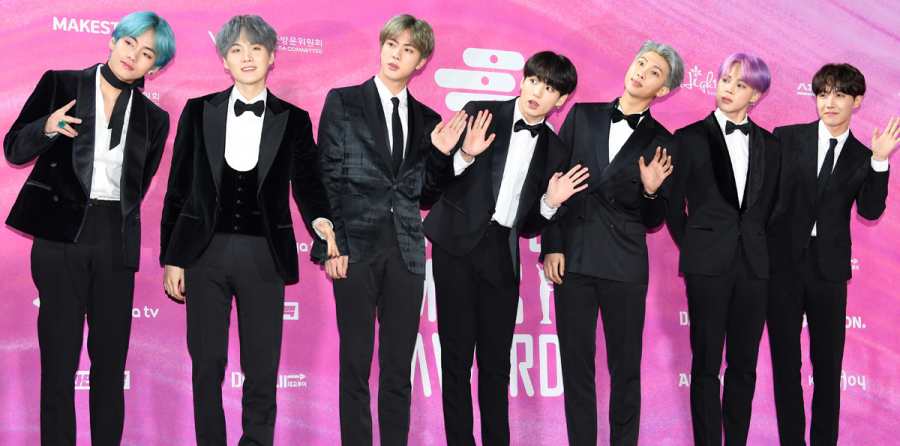Why BTS’ Grammy nomination isn’t so “Dynamite”
An opinion piece on xenophobia and conformity in the music industry
BTS at the 2019 Seoul Music Awards on January 15, 2019.
December 10, 2020
Boy band BTS has made history as the first K-pop group to be nominated for a Grammy in a major category.
“Dynamite,” the first fully English outing that BTS has released and arguably, the first of their songs that has reached the United States mainstream, has been nominated for a Grammy for Best Pop Duo/Group Performance. It is their first nomination.
To nominate BTS for a Grammy is to effectively nominate them for an award and a song that will define their entire career up to this point.
For “Dynamite,” they will be “Grammy-nominated” or “Grammy-winning” BTS for the rest of their careers. It is the song that determines this prefix that influences first impressions, thoughts, and opinions of future fans or foes. For that prefix to be determined by an English song that is far-removed from the complex storylines and themes of the rest of their work is an injustice to them and their Asian background that brought them their success.
People have very much recognized and celebrated their Korean language music—so much so that “Life Goes On,” a Korean language song from their 2020 album “BE,” has become the first non-English song to ever go #1 on the Billboard Hot 100.
With lyrics expressing self-doubt, struggles with mental health and self-worth, fears of inadequacy and loss—which are seldom addressed in the K-pop industry and even less so in Asian countries themselves—and also, expressions of encouragement of self-love, empowerment, perseverance, and acceptance, BTS’ Korean music is not lacking in deeper meaning and eloquent interpretations of their own hardships and successes.
So why was it one of their songs with lyrics like, “Ding dong, call me on my phone / Ice tea and a game of ping pong,” that was nominated? “Dynamite”’s lyrics are relatively simplistic, focused more on the buoyant, disco-pop sound more than anything else.
It is a stark contrast to an earlier 2020 Korean single of theirs, “Black Swan,” which touches on the death of passion and their fears about it, expressing, “If this can no longer resonate / No longer make my heart vibrate / Then like this may be how / I die my first death.”
That is not saying that happier, upbeat songs do not deserve to be nominated, nor that more serious songs are better. However, it is obvious here that the happiness and upbeat nature of this song is not what earned them the nomination, nor what set this song apart from the rest of their discography—it is the ability to say that the biggest boyband in the world, possibly ever, has finally been nominated for a Grammy, satisfying them, their fans, and the Western ideals that BTS has been pushed in to.
The only thing that sets “Dynamite” apart from the rest of BTS’ discography—one filled with similar, upbeat, well-meaning songs—is the fact that it is in English. That it includes a plethora of Western references, sound, and marketing opportunities. It is effectively Western, and is as far removed from their Korean music as they can be without straying too far from the image that got them their success.
There is no denying that “Dynamite” is a nice song, and has a good message, no matter the language. Yet there is also no denying that the Korean group has made and will continue to make better music, both lyrical and production wise, in their native language and country; they deserve to be recognized for this music.
What does this say for the rest of the large and far-reaching K-pop industry that has also begun branching out to the West? That the likelihood of being officially recognized for their music is high when they conform to Western standards and language instead of being themselves? What does this say for foreign artists in general?
Western conformity has become a threat to foreign creativity.
At this point, it boils down to xenophobia. It boils down to The Recording Academy touting inclusivity, equality, and diversity, but failing to truly recognize these ideals musically by keeping to the traditional, Western influenced music that has defined its awards ceremony for decades.
BTS has helped pave the way for Asian artists to achieve in the West. Despite this important and historic entrance, there is still a long road to true, official recognition and appreciation for the foreign artists that have captivated millions of Westerners already.



